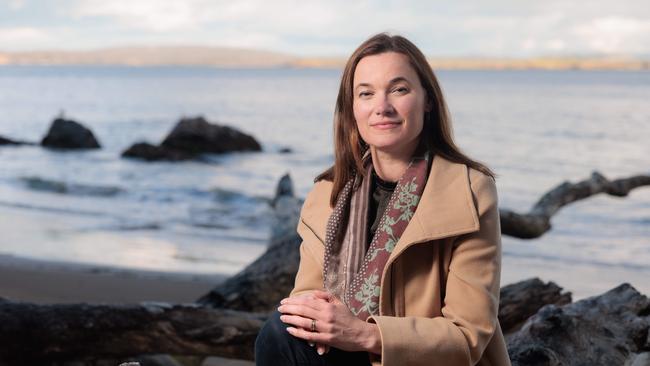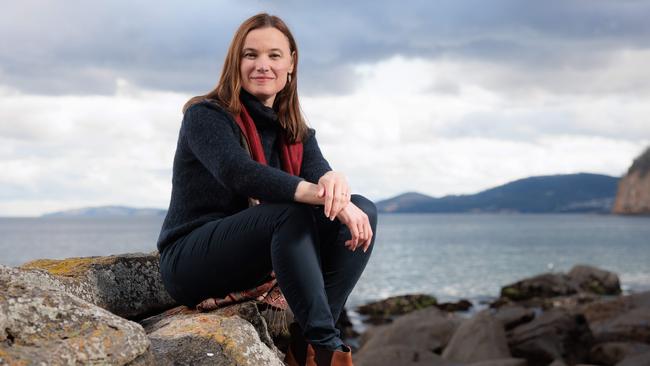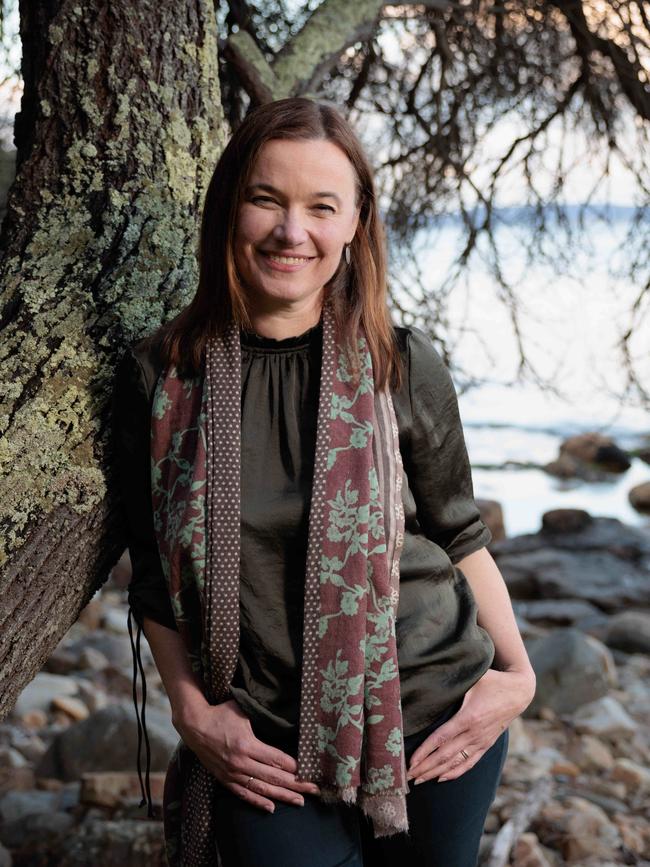A Wild Heart wins The Australian Fiction Prize
Katherine Johnson’s tale of a spirited young woman in the wilderness of Tasmania has triumphed over top quality competition to take out the inaugural The Australian Fiction Prize.

How does it feel to be named the inaugural winner of The Australian Fiction Prize? Katherine Johnson, 53, of Hobart, realises how amusing this is, but she could hardly find the words.
“This prize is the best thing that has happened in my writing journey,” she (finally) says.
“After getting the news, I was in a kind of good shock. It reminded me of an experience seeing a pod of humpback whales feeding off Tasmania. They came up to the boat we were in, these massive creatures, feeding in unison; it was just incredible. I had to sit in the car afterwards for quite a while, trying to believe what had just happened.”
Johnson has won the prize — which comes with a cheque for $35,000 and publication of her manuscript by one of Australia’s top publishing houses, HarperCollins Australia — for a book-length story, tentatively called A Wild Heart, about a spirited young woman called Min, or Minnow, who lives on remote Maria Island, off the east coast of Tasmania.
Few Australians have been there, but Maria Island is a real place. It’s pronounced Mariah (as in Carey) and it is accessible only by boat from the wharf at Triabunna. There are no shops or fancy hotels, and hardly anywhere to charge your phone. Day trippers are invited to explore painted cliffs, shady bays, and old ruins. Visitors are also asked to take the Maria Island Pledge to “protect the furred and feathered residents”.
“Wombats, when you trundle past me, I pledge I will not chase you with my selfie stick … I will not surround you, or try and pick you up,” the pledge goes.
Johnson says the island is a “very special place” for her family, with many barefoot memories made there.
“My husband Craig is a marine scientist, and every year, over Easter, he would run a field trip for university students on Maria Island,” she says. “We’d go and stay there, from when my children were babies, for that week of absolute awe and wonder.”
Johnson describes Maria as “a Noah’s Ark of rare species” because many birds and animals have been taken there, in order to protect them from land overdevelopment. Her passion for the Tasmanian wilderness shone through every word of her manuscript, and it’s a shock to learn that she’s not actually from Tasmania.
“I’ve been here a long time, decades, but I actually grew up on a river block in Brisbane, a place called Fig Tree Pocket,” she says.
“My grandparents owned it originally, and it was wild in the sense of no fences, kids exploring an open and quite natural kind of environment.”

Her childhood home was “a modest Queenslander, sort of old” with kids dodging bindi-eyes in the back yard, “and we had a fig tree and that was our Magic Faraway Tree for kids in the neighbourhood … I sort of grew up in that tree.”
Johnson combined her love of words and the natural world at university, studying both journalism and science, “because I couldn’t really choose between them”.
She took a job as a science writer at CSIRO, where she came upon a story about the illegal fishing of the Patagonian toothfish in waters of Heard Island.
“Illegal fishing was threatening the stocks, and an Australian patrol boat actually pursued a Uruguayan boat almost to South Africa,” she says. “It was the longest chase in maritime history.”
Her imagination caught fire, as she started thinking about “the people on the boats, and the families back on shore. And that’s what really what launched me into novel writing.”
Johnson’s first novel, Pescador’s Wake, based on that chase, was published in 2009. She’s since written another three books, and she was pleased to hear The Australian Fiction Prize wasn’t only for emerging or debut writers, but for anyone seeking the shot of adrenaline it brings.
Johnson says she had a “strong sense” of the main character, Min, “and what makes her tick and what she loves, and what she’s afraid of, and what she’s yearning for. Although I don’t necessarily have a really strong visual image of her in my mind. Isn’t that funny?”
Another important character in the book is Lucie, an Australian journalist working in London, who comes across the frankly rather tatty specimen of a Tasmanian tiger while visiting the glorious National History Museum in South Kensington (it’s still free, and accessible to all).
“I guess she’s the journalist in me, interested in reporting but she also provides an external perspective on Min,” says Johnson. “She can see what’s happening.”
Johnson’s story starts with a mystery death, “and we’re not sure who that is, or what’s happened”. The reader becomes invested in Min’s welfare, as the mystery unravels.
For the judges, the book bought to mind Holly Ringland’s The Lost Flowers of Alice Hart, and even Trent Dalton’s Boy Swallows Universe, or Where The Crawdads Sing by the American zoologist, Delia Owens, with its emphasis on a vulnerable young person, seeking to make their way in an often dangerous world.
The head of fiction at HarperCollins, Catherine Milne, said: “We are all absolutely delighted that A Wild Heart is the winner of the inaugural Australian Fiction Prize. It stood out straightaway as a serious contender; we all loved the evocative, wild setting of Maria Island, the beautiful nature writing, the plot propelled by a mysterious death. It’s a sweeping, beautiful and emotional novel of the struggle between independence and control, nature, love and courage. It will be a joy to publish and bring to readers everywhere.”
Fellow judge Letitia Davy, of Gleebooks Dulwich Hill, described the work as “a beautifully atmospheric, absorbing and tender novel. I was transported to this wild place and felt deeply for Min, our 18-year-old protagonist who is torn between duty and a desire to live a life that is her own. There is something magic in these pages.”
Literary agent Samuel Bernard, who was also on the judging panel, adored the “possibility of rewilding the extinct Tasmanian tiger”.
“Without a doubt, this cinematic tale is a deserving recipient of the inaugural prize,” he said.
Speaking as one of the judges, I wanted to take the free-spirited Min under my wing. I could see readers taking her into their hearts, and cheering her on, as she takes her first, tentative steps toward freedom, and a life of one’s own. And Maria Island glows like a precious jewel.

Upon finishing the manuscript, I went straight to Google, to find out whether I could actually visit (you can, by boat!) and I will carry the characters with me, when I go there.
“I really cared for Min, too” says Johnson. “And I hope that readers will really care for her, because she’s young and she’s vulnerable, but she’s also clever. But she’s very naive. She doesn’t see danger when it’s there. And so, she is a character that I am very, very close to … even though I can’t see her face!”
Johnson completed the book between other gigs, including her job in communications at the University of Tasmania, where she writes “about the interesting careers that people who have left the university have had, that kind of thing”.
She received an Arts Tasmania grant, “which was incredibly helpful to fund some of the writing and rewriting” of A Wild Heart, and she is part of the thriving writing culture on the island of Tasmania, which is home to a Booker Prize winner, Richard Flanagan, as well as Robbie Arnott and Heather Rose, whose gorgeous memoir Nothing Bad Ever Happens Here was one of The Australian’s books of the year in 2022.
“There is a great community of writers, and we are connected with each other, and with the place,” says Johnson. No, there isn’t “something in the water” but there is plenty of pristine wilderness, where writers can enter a meditative space.
“We visited Bruny Island this past weekend, and honestly, you could look at that beach and think that looks exactly the same as it would of pre-settlement,” says Johnson.
“It hasn’t changed and it’s untouched. And to be able to go somewhere like that, where you feel like you’re transported in time, it can’t help but inspire you in all sorts of ways.”
Johnson says literary prizes are “energising” for writers because “you squirrel away at something for years, in the hope that you will connect with readers and you hope to keep going at this thing that you love doing and that you’re working hard at”.
“I love writing books and bringing these stories to life, and it’s a strange thing trying to explain that drive to people. I’m not even sure that I understand what the drive is to write. I just cannot not do it.”




To join the conversation, please log in. Don't have an account? Register
Join the conversation, you are commenting as Logout